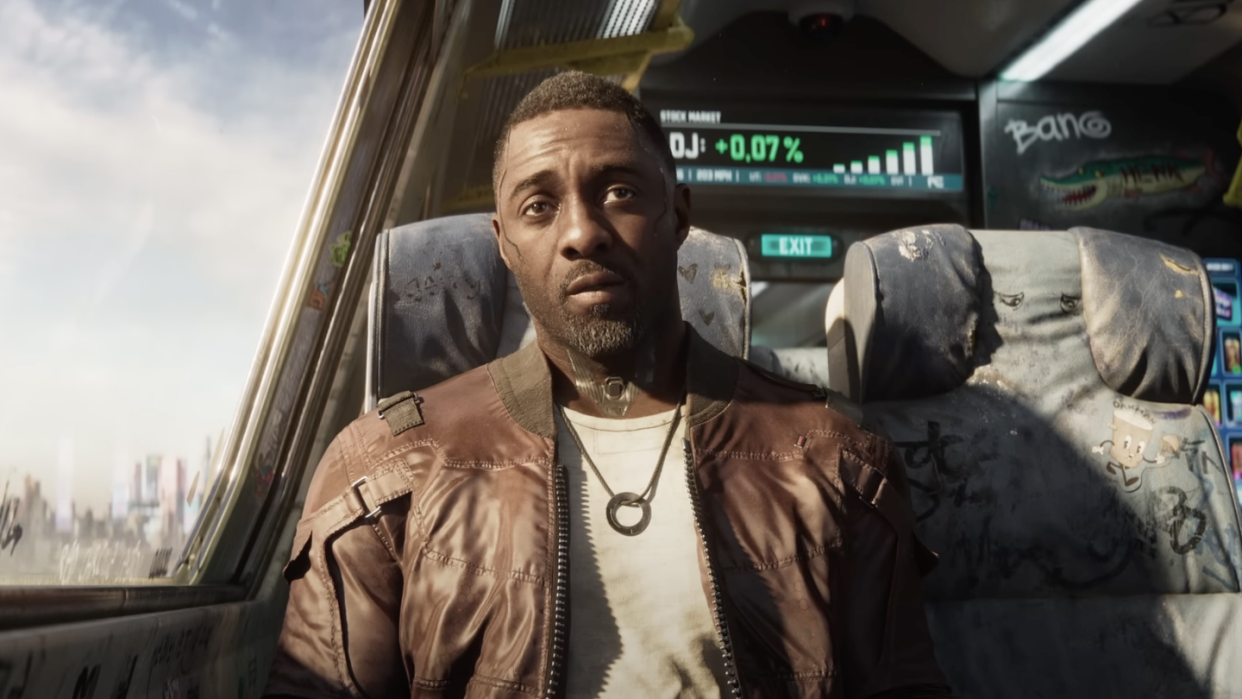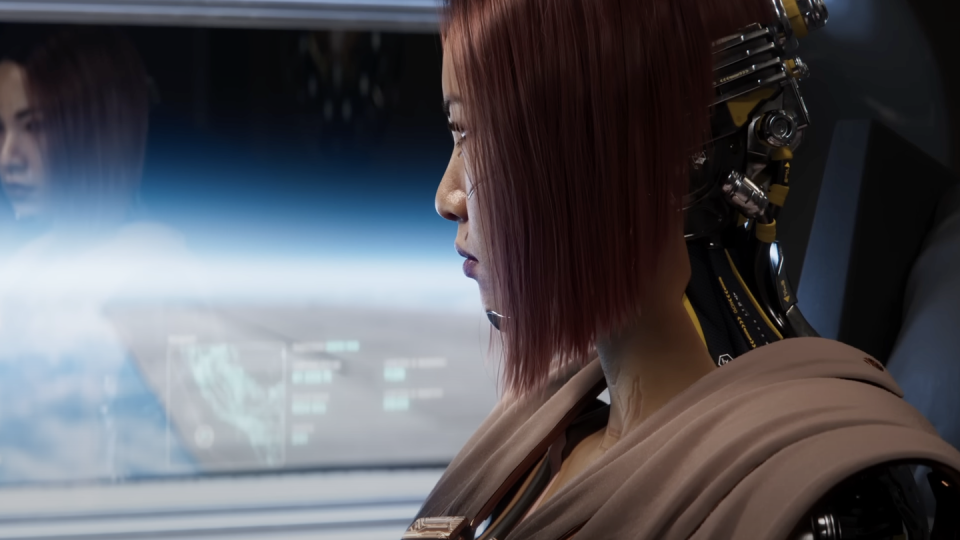'Cyberpunk 2077' Is (Finally) a Dystopia I Want to Live In

- Oops!Something went wrong.Please try again later.
When Cyberpunk 2077 debuted in December 2020, you did not need much help imagining a dystopia. Uprisings against police brutality were met with military force. The presidential election seemed capable of stretching on for eternity, one Orwellian press conference after the next. You were likely planning some sort of “Zoom Christmas.” Your definition of a good time was “taking one of the big gummies and going for a walk.” Maybe you sidled up to a bar and ordered a drink behind a partition, hoping nobody you knew saw you.
Into this desperate context zoomed Cyberpunk 2077 on a lightcycle made of neon-hued hype. Developer CD Projekt Red’s previous game, The Witcher 3, was one of the most ambitious RPGs ever made—a sprawling, personal, writerly tale, told across dozens of hours of high-fantasy hokum. When Cyberpunk arrived, it was legendarily borked and borderline unplayable. Characters swam through the air, unmoored from physics. Missions terminated in irresolvable objectives. The police, so essential to the give-and-take stakes of the Grand Theft Auto games Cyberpunk clearly sought to evoke, alternated between nonexistent and omnipresent, appearing magically behind you the second you accidentally pulled out your katana. In December 2020, it felt all too fitting: even our fictional dystopias were fucked.
So rich was this to a cohort raised on cyberpunk visions—a dystopian game released in astonishingly dystopian times, stuffed with a what is reality? ubertext awash in text-shattering glitches—that fried everyone’s brains. A PR person at CD Projekt Red riled the game-playing public this summer by claiming that “it became a cool thing to not like” Cyberpunk when it first came out. The truth is that the game was just too much. Too much promise, too many ideas, too broken, too densely plotted, too many references to other games and movies, too weird, too ambitious. It was impossible to look at directly. Probably the definitive critical read of the game is Tim Rogers’s 10-hour video review on YouTube, the end of which finds Rogers broken, standing in a field decrying contemporary video games. This is what Cyberpunk did to people.
CD Projekt RED has spent the ensuing three years on an apology tour, releasing update after update of fixes and free additions. Clearly they were priming the public for a "Cyberpunk is fixed now" narrative alongside today’s release of the game’s only DLC, Phantom Liberty. And that narrative is true. Cyberpunk is finally fixed, thanks to a full mechanical overhaul of the looting, crafting, and progression systems, responsive police patrols, better-designed menus, vanishingly few game-breaking glitches, and a densely packed new region to explore—alongside a high-stakes campaign and a bunch of other open-worldy things to do. Playing it, you feel as if the firmware of reality has been updated. You can look at the game directly without going insane.
What you see is what was always there: one of the great video-game worlds, full of brutalist megastructures, fog-enshrouded solar fields, and serpentine back alleys strewn with burnouts and filth. The game’s narrative winds through nodes of data like a hacker infiltrating a system, slashing through layers of encoded intel and hulked-out freaks with an assortment of over-the-top weapons. When Cyberpunk 2077 was broken, its propulsive tone—with heists occurring across multiple missions and every character in a constant state of urgency—felt grating. Now, it feels aligned with the game's sleazy, burnt-out world.
Cyberpunk 2077's protagonist, V, is a frayed wire, her cellphone constantly exploding with jobs and intel and spam. Her brain overloaded with hallucinations of Keanu Reeves, voiceover chatter, and sometimes a talking gun. When given a choice between two options, they both suck, and you just pick one. Even graphical upgrades, like pedal-to-the-metal raytracing, function more as painterly obfuscation than any sort of clarifying agent. It’s way too much, but it all feels intentional now: a wash of gorgeous colors and noise.
For cyberpunk dilettantes, that means coming to terms with the fact that this game was never a moody, ambient Blade Runner simulator. Rather, it's an over-the-top take on Robocop’s seedy hellworld, full of hyperviolence and “I’d buy that for a dollar!” cultural flatlines. Porn is everywhere: If you want a picture of this future, imagine a dude making a cumface... forever. Perhaps this is the best explanation for the game’s strange relationship to music. Cyberpunk fiction and film has inspired so much revolutionary music—Oneohtrix Point Never, El-P, Sonic Youth, Flying Lotus, JPEGMafia, the list goes on—that the game’s obsession with cheesedick “rockerboy” culture feels increasingly like its biggest miss. Reeves’s character, Johnny Silverhands, seems modeled on mid-career Axl Rose. Every radio station, no matter how ostensibly differentiated, eventually devolves into rocktronica. Plus, every mission is still titled after boomer classics like “Smoke On The Water” or “Happy Together.” The idea that this is the music of the future is perhaps the game’s most troubling dystopian conceit.

Then again, the music is all-consuming, woven through everything, intentional if ill-advised. This slimy L.A. freakout is the game Cyberpunk 2077 was always meant to be. Its triumphs vastly outmeasure its faults, even when you're completing a mission named after a Slipknot song. Phantom Liberty solidifies this, leaning into the strangeness at the game’s core. Its Call of Duty-scale adventure leaps through platforming sections and open-world police-state exploration. It contains 100 percent more Idris Elba than the game held previously, but also guns-blazing chase sequences and new ideas about how characters can interact. Tense, weapons-drawn standoffs become a structural convention, daring you not to squeeze the trigger.
It all feels very, very good to play. Driving, shooting, scanning hallucinatory graffiti—all of it slaps. Perhaps this is reductive, but it’s worth closing the loop on a story that began as disastrously as this game’s did: CD Projekt RED fixed it. In doing so, they completed a metatextual story about a studio that dared to dream of something even more ambitious than The Witcher 3’s sprawling adventure. Cyberpunk 2077 is, instead, a series of nested campaigns, dense with individual intrigue, each barreling toward some hidden information that when retrieved unlocks new pathways for narrative data to flow. Much of the leveling-up happens between your ears. You roleplay by choosing to listen to certain frequencies of conversation, and opting to ignore certain strands of story. You're a mercenary who is fighting to stay alive in the sea of information.
If The Witcher 3 represented a paragon of the open-world RPG form, Cyberpunk 2077 is part of a wave of games, like Elden Ring and Death Stranding, that look to complicate that form and move beyond it. To turn the very act of choosing where to go into a story told by the player. It feels, finally, like a glimpse into the future.
You Might Also Like

